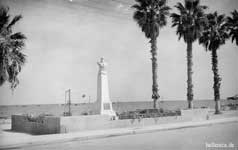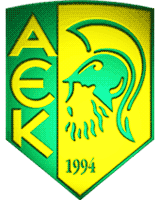|
|
Kimon (Greek Κίμων, also spelled Cimon in traditional Classical scholarship contexts) (510, Athens-450 BC, Salamis),son of Miltiades, of the deme Lakiadai was a major figure of the 470s BC and 460s BC in Athens. His mother was Hegesipyle, the daughter of Olorus the King of Thrace. His father died in jail because he was unable to pay the fine that was levied against him. The fine passed to Kimon and it was his sister's fiancé Callias, a very wealthy Athenian, who paid it so that he could marry Kimon's sister Elpinice. Kimon was said to have been "as brave as Miltiades, as intelligent as Themistocles and more just than either man". Kimon was very wealthy and lived lavishly, he was also very generous to the people, opening his house to all and feeding the hungry. He was imposing, and was said to be able to fill a room with his presence. He was most definitely a brilliant soldier, and was honest and merciful. Kimon was very pro-Spartan, and believed in dual hegemony. He was an oligarch and supported the constitution of Cleisthenes which distributed power between the upper class and middle (hoplite) class. Kimon served in the Persian Wars and according to Plutarch: "In all the qualities that war demands he was fully the equal of Themistocles and his own father Miltiades". Kimon served with great distinction at the Battle of Salamis.
Athenian General Kimon in the Logo of the Footballteam AEK Larnaca in Cyprus Και Νεκρος Ενικησα (Even in death I was victorious) Kimon entered into politics on the staff of Aristides in Byzantium. It was under Aristides that Kimon grew. He entered into politics in Athens when the people began to grow tired of Themistocles, and because of this they promoted Kimon to the highest honours and offices in the state. When Xerxes's forces approached in 480, Themistocles passed the decree for evacuating Athens and to rely primarily on naval power. It was Kimon who led a procession of youths up to the temple of Athena to burn their knightly horse-bridles as offerings, and to subsequently enlist as marines. In 475 BC, Kimon won the Athenians’ hearts by avenging Theseus’ death. Kimon found a tomb with bones alleged to be those of Theseus and he carried these in triumph to Athens. In the years between the ostracism of Themistocles in 472 and his own loss of prestige in 461, Kimon was the most influential Athenian. He firmly believed in the growth of Athenian power through expansion in the Aegean, and between 478 and 461 he led the forces of the Delian League against the Persian Empire. He was largely successful in expelling the Persian presence from the Aegean, which was replaced by Athenian control. For this, Kimon was said to be an essential factor in the Athenians ability to leverage control away from the Spartans. Furthermore, Kimon was a proponent of policies that enabled the transformation from the Delian League to Athenian Empire; members who were once regarded allies found themselves pressured into mere tribute-payers. In the year 464 Sparta experienced the effects of a huge earthquake and the helots revolted. Kimon led 4,000 Athenian hoplites to assist the Spartans in 462, but was turned away (ostensibly because of fear about their revolutionary democracy). The Athenians were outraged at this and ostracised Kimon in 461. He was ostracised for ten years, but was returned to Athens early because he was needed to serve in battle facing a Peloponnesian invasion. Kimon's ostracism was revoked by Pericles, one of his main opponents. Kimon wished to see Persian power broken, and maintained this objective until his death. Upon his return in 451, he was granted permission from the Assembly to launch a campaign to free Cyprus from the Persian empire. However, Kimon died around 450 while laying siege to Citium during the Salamis, Cyprus campaign (see the Battle of Salamis). The campaign was soon abandonded. Even on his deathbed, he plotted against his enemies by urging those about to conceal his death from both allied and Persians. His crew was brought back in safety “under the command of Kimon," who by then had been dead for thirty days. The quote "Even in death I was victorious" was attributed to Kimon. A statue of 'Kimon the Athenian' stands proudly on the sea front promenade of modern Larnaca. Stesimbrotus of Thasos, who lived near about the same time with Kimon, reports of him that he had little acquaintance either with music, or any of the other liberal studies and accomplishments, then common among the Greeks; that he had nothing whatever of the quickness and the ready speech of his countrymen in Attica; that he had great nobleness and candour in his disposition, and in his character in general resembled rather a native of Peloponnesus than of Athens; Plutarch
Retrieved from "http://en.wikipedia.org "
 |
|
|||||||||||||

